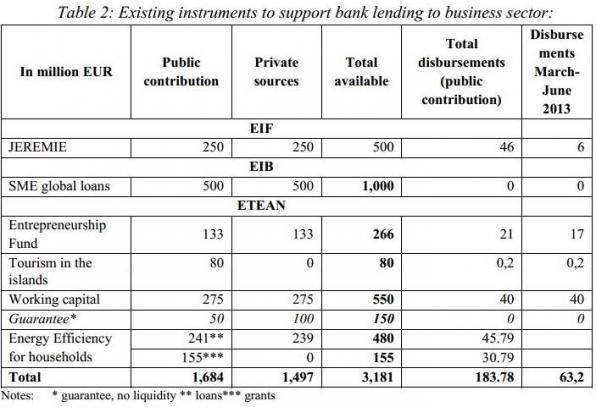Of €3 billion available, only 180 million have been disbursed to a business community struggling to overcome a freeze in lending.
The Task Force for Greece (TFGR), a body set up by the European Commission to help Greece implement the fiscal adjustment and structural reform program, released its fifth activity report, covering the period of April-September 2013.
The Task Force is being critical of the “unsatisfactory” disbursement of funds, available or supported by the EU, to a business community struggling to overcome a freeze in lending: “With respect to the various financial instruments available that are supported by the EU, disbursements have been limited during the period under review: the situation remains unsatisfactory given the very high needs of the Greek business community”.
Of €3 billion available, only 180 million – 6 per cent – have been disbursed.
The dire condition in which businesses find themselves when it comes to access to bank lending, become evident in a table titled “Existing instruments to support bank lending to business sector” (table 2, pp. 18-19 of the report).

The report notes progress in the field of public finance of tax collections. For example: “building a semi-autonomous revenue administration”. The target, not mentioned but implied here, is a fully autonomous revenue administration.
Another positive finding that becomes less impressive under scrutiny regards “signs of increased efficiency on the part of the tax administration: the number of completed audits of large taxpayers has more than doubled over the first seven months of this year compared to last year (164 vs 66)”. The increase is impressive, indeed. But considering that the so-called Lagarde List of suspected tax evaders alone has over 2,000 names, 164 completed audits is a drop in the ocean.
Task Force Quarterly Report Oct 13
The report concludes that not enough funds are being provided for priority projects to be properly implemented, something that would boost the economy and improve public services, especially in healthcare, public administration and trade facilitation. There is specific mention of what the TFGR calls “EU centrally managed budget lines” that provide resources which “fall far short of what is needed”. Moreover, there is reference to “unused resources from cohesion policy funds which are managed by the Greek authorities” – the key terms here being “unused” and “managed by the Greek authorities”.
|
TPPi Explainer: What is the Task Force
The Task Force for Greece was launched on 20 July 2011 and three months later started work on identifying and coordinating the technical assistance that Greece requested in order to deliver commitments undertaken in exchange for bailout loans. Today, it coordinates technical assistance across 12 broad policy domains, each comprising a number of specific projects: acceleration of cohesion policy projects; financial institutions/access to finance; administrative reform; budget and taxation; anti-money laundering and anti-corruption; business environment; health reform; judicial reform; labour market, social security, innovation and education; asylum and migration; privatisation and land registry; and network industries and services. It reports to European Commission President Barroso and works under the political guidance of Vice-President Olli Rehn. The head of the Task Force, Horst Reichenbach, reports regularly on progress to the Greek authorities and to the Commission. Georgette Lalis is the head of the Athens office. The Task Force consists of around 60 staff and is based jointly in Brussels and Athens. Many Member States – notably France, Germany and the Netherlands – have also made large numbers of senior experts and officials available, often assuming the full costs of this contribution. |